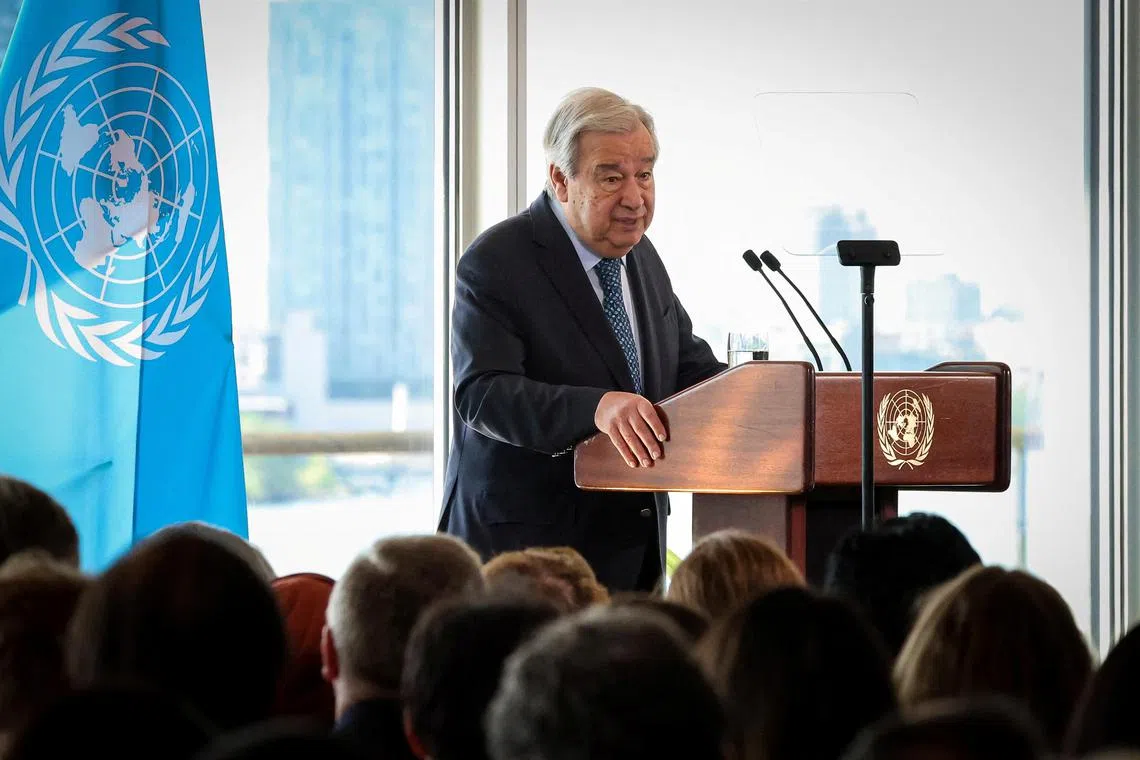UN lays out survival plan as Trump threatens to slash funding
Sign up now: Get ST's newsletters delivered to your inbox

Mr Antonio Guterres’ plan calls for 20 per cent cuts in expenditures and employment, which would bring the UN’s budget to the lowest since 2018.
PHOTO: REUTERS
NEW YORK – UN Secretary-General Antonio Guterres is slashing more than US$700 million (S$900 million) in spending and laying plans to overhaul the United Nations as its largest sponsor, the US, pulls back support.
Mr Guterres’ plan calls for 20 per cent cuts in expenditures and employment, which would bring its budget, now US$3.7 billion, to the lowest since 2018. About 3,000 jobs would be cut.
Officially, the reform programme is pegged to the UN’s 80th anniversary, not the new US administration. But the scale of the reductions reflects the threat to US support, which traditionally accounts for 22 per cent of the organisation’s budget.
US President Donald Trump has suspended that funding and pulled out of several UN bodies already, with a broader review expected to lead to further cuts.
“We’re not going to be part of organisations that pursue policies that hamper the United States,” state department deputy spokesman Tommy Pigott told reporters on July 31.
The planned cuts at the UN come as the Trump administration has eliminated tens of billions of dollars in foreign aid as part of its drive to focus on what it sees as US interests. Conflicts from the Middle East to Ukraine and Africa have added to the need for global assistance.
After years of financial struggles, the UN under Mr Guterres already was planning to make sweeping structural changes. He warned in January that it was facing “a full-blown liquidity crisis”.
Overall, spending across the UN system is expected to fall to the lowest level in about a decade – down as much as US$20 billion from its high in 2023.
“UN80 is, in large part, a reaction from the Secretary-General to the kind of challenges posed by the second Trump administration,” said Mr Eugene Chen, senior fellow at New York University’s (NYU) Centre on International Cooperation.
Mr Guterres is expected to release details of his overhaul plans in a budget in September. The plan calls for restructuring many UN programmes.
Mr Guterres controls the UN’s regular budget, which is only a fraction of the total expenditures of its affiliates. Facing funding shortages of their own, agencies like Unicef and Unesco are also planning major cutbacks.
The Trump administration already has stopped funds from going into the UN Relief and Works Agency for Palestine Refugees in the Near East, withdrawn from the UN Human Rights Council and left Unesco.
Mr Guterres’ plan has also drawn criticism, from both Trump allies and inside the UN.
“There are some things that the UN does that arguably should be increased in terms of resources,” said Mr Brett Schaefer, senior fellow at the conservative American Enterprise Institute. “And then there are some things that the UN shouldn’t be decreasing but eliminating altogether.”
He cited the UN’s nuclear watchdog and the World Food Programme as contributing significantly to US interests, and singled out the Food and Agriculture Organisation and Human Rights Council as having mandates at odds with American policy.
Meanwhile, UN staff in Geneva announced last week they had passed a motion of no confidence in Mr Guterres and the plan.
“Staff felt its slash-and-burn approach lacked focus, had no strategic purpose, and was making the UN more top-heavy and bloated,” Mr Ian Richards, president of the UN Staff Union in Geneva, posted on LinkedIn about the UN80 report.
That vote has largely symbolic importance, according to NYU’s Mr Chen.
Still, Mr Guterres’ efforts to get ahead of the inevitable cuts that reductions in US support will bring could help the UN adapt, he added.
“Maybe that’s a silver lining,” Mr Chen said. “We’ll all be primed for reform.” Bloomberg


